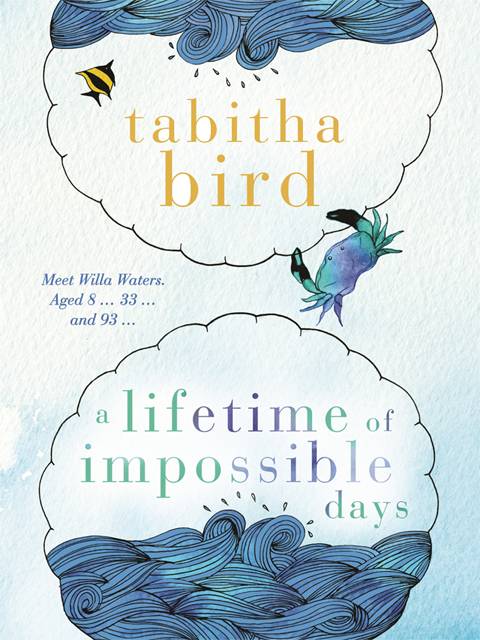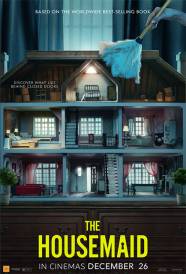A Lifetime of Impossible Days

Love Between The Pages Book Club: June
Tabitha Bird's stunning debut is a magical, life-affirming novel about heartbreak, healing and learning to forgive yourself. Meet Willa Waters, aged 8 . . . 33 . . . and 93.
On one impossible day in 1965, eight-year-old Willa receives a mysterious box containing a jar of water and the instruction: 'One ocean: plant in the backyard.' So she does - and somehow creates an extraordinary time slip that allows her to visit her future selves.
On one impossible day in 1990, Willa is 33 and a mother-of-two when her childhood self magically appears in her backyard. But she's also a woman haunted by memories of her dark past – and is on the brink of a decision that will have tragic repercussions . . .
On one impossible day in 2050, Willa is a silver-haired, gumboot-loving 93-year-old whose memory is fading fast. Yet she knows there's something she has to remember, a warning she must give her past selves about a terrible event in 1990. If only she could recall what it was.
Can the three Willas come together, to heal their past and save their future, before it's too late?
Tabitha Bird is a writer and poet who lives and works in the rural township of Boonah, Queensland. By day Tabitha may be found painting, working on her next book or with her husband, three beautiful boys and Chihuahua.
A Lifetime of Impossible Days
Penguin Australia
Author: Tabitha Bird
ISBN: 9780143792260
RRP: $32.99
Interview with Tabitha Bird
Question: Where did the idea to write this book in three separate times of Willa's life come from?
Tabitha Bird: In my early thirties I had run so hard and so fast from my childhood trauma that I had forgotten who I was, what I wanted out of life. Struggling to cope with painful memories, there were days when I could not get out of bed. My husband bought me a chihuahua during that dark period and I named her Lion. She was a loin to me. Valiantly, that little dog fought to be beside me and protect me from anything that moved. She knew I needed her. She taught me about courage. That there was power is simply staying close by. She would be there for every word of the book that I was about to write.
During that time I was asked a simple question by a most wise counsellor: what does the pain look like? It never occurred to me that my pain could have colour or texture or perhaps even a voice. I began to write about a character named Beast who had a little girl trapped in the cave of my heart. This would be the kernel of the idea for the youngest character in my novel named Super Gumboots Willa.
As I began healing, I would often say to my counsellor how much I wished I could go back and love the little girl that I was, how sorry I was for hating her and how I wanted to embrace her. Through writing Super Gumboots Willa I got to do exactly this. It wasn't long before a much older character wanted to speak to me about fighting for a healthy, love-filled future. I began to play around with the question; what if you could meet your younger and older selves? What would they say? What might they want you to know?
Through Silver Willa, the ninety-three-year-old character, I began exploring how much our future self might really care about the outcomes of our healing. I wanted to show what might be at stake if 'present day self' never healed and kept running from the pain of the past. Which of course meant my story needed a 'present day self' character and Middle Willa, aged thirty-three, was born.
The Willas at three different ages met and played out on the page the fight for Willa to heal and to save herself, to take back her power, to confront her abuser and to create a future she was proud of. I often wanted to be 'mothered' and 'cheered on' by older me when I was healing. This story was my way of doing that. A Lifetime Of Impossible Days became my emotional truth and my fight for self-love presented a totally fictional world.
Question: What was the best part about creating the character of Willa Waters?
Tabitha Bird: Willa Waters at all three of her ages showed me that there is something precious to be learned by looking a life through different eyes. Super Gumboots Willa showed me how innocent I was as a child, that it wasn't my fault. She took my hand and taught me how to play again, how to imagine and the importance of fun. She knew that imagination fuelled by courage can be enough to get one through.
Middle Willa urged me to look back on my thirties with more compassion. She showed me that a messy love and imperfect life is good enough. That I am enough simply because I show up and I keep trying.
Silver Willa gave me hope. She wanted me to see that we should never give up on our futures and that we are not the sum of what has happened to us. We can take what has been done to us and transform our lives into something beautiful.
Question: How did reflecting on your younger years help you move forward?
Tabitha Bird: Trauma silenced my voice by reducing me to fear, by insisting that I was worth nothing and that other people could do to my body whatever they wanted. It wasn't until I began counselling and healing that I realised those messages were untrue. Looking back on my younger years to things that had been modelled for me in the violence of my parent's marriage and in the abuse toward myself, I began to see that these life patterns were not normal or healthy. My counsellor urged me to write to her in between sessions and I realised that I had something I wanted to say. Something that had been sitting inside me all these years. A whole story was birthed from those emails. Through my characters, I gave my pain a voice and all three of the Willas helped me move forward.
Question: What message do you hope readers take from A Lifetime of Impossible Days?
Tabitha Bird: Middle Willa receives an invitation from her counsellor during the story. The invite simply reads;
An Invitation;
Have you met your own Super Gumboots Willa?
Where: You decide
When: in your own time.
This is the same invitation I extend to readers. Perhaps their inner child has something it wants to tell them. Maybe the message is as simple as, 'Hi! Remember me? Want to play with me some time?" But when I met my younger self, I began to see all the places where I was stuck in destructive ways of thinking and being.
The problem with trauma is that if it is not worked through then we can become trapped emotionally at that age. We don't grow into healthy ways of thinking and understanding ourselves and the world around us. And trauma can be anything, any event, large or small, in which we have not had adequate support to work through what happened or our emotions.
Pain is a time traveller. It comes from the past and hangs onto our futures. We can try to ignore it, pretend it away or run from it, but in my experience, true healing only comes when we sit down with our past and ask it some questions. What am I afraid of? What am I pretending I don't know? What do I need help to overcome? What do I think about myself and why?
In my novel eight-year-old Willa Waters receives a jar of water with the instructions: 'One ocean. Plant in the backyard.' From that planted ocean grows a time slip through which the Willas can meet themselves at different ages. My wish for readers is exactly the same: the gift of an ocean and perhaps a way to explore meeting their own younger selves while hanging onto the hope of their futures. They do say that salt heals wounds.
Question: What can we do, to learn to forgive ourselves?
Tabitha Bird: Gentleness and grace and self-love. For me these three words are life, they are breath, but they were once words that I once knew nothing about. Abuse taught me that I deserved harshness, that I wasn't worth loving unless I got everything right all the time and looked after everyone else's needs. I didn't know that I wasn't responsible for other people's choices or that I deserved to be treated with gentleness. Outside pressing and verbally abusive voices from my past became my internal voice. These were patterns I had to unlearn. I still challenge the way I talk to myself. I stop and ask myself if I am being kind with my inner dialogue and extending myself some understanding.
I think I began to forgive my past mistakes when I realised I was entitled to be imperfect, that it was okay to get things wrong and that this did not make me flawed but simply human. I also realised that it was okay, in fact necessary, to remove toxic family members from my life. Society often tells us that family should stick together at all costs. But I would like to challenge that notion. Family should stick together if they support each other and operate in healthy, life-giving ways. Abuse is always a deal breaker. Ignoring the past or minimising people's pain is also unhealthy.
If I could tell thirty-year-old me something it would be not to push myself. To give myself grace because healing takes time. I'd tell myself that even in my mistakes I am seen, known, and held by the found family I have drawn around me, by my husband and by my children. I'd tell myself to hold on. Because things turn out so much better than your wildest dreams.
Interview by Brooke Hunter
A Lifetime of Impossible Days
Penguin Australia
Author: Tabitha Bird
ISBN: 9780143792260
RRP: $32.99
MORE





